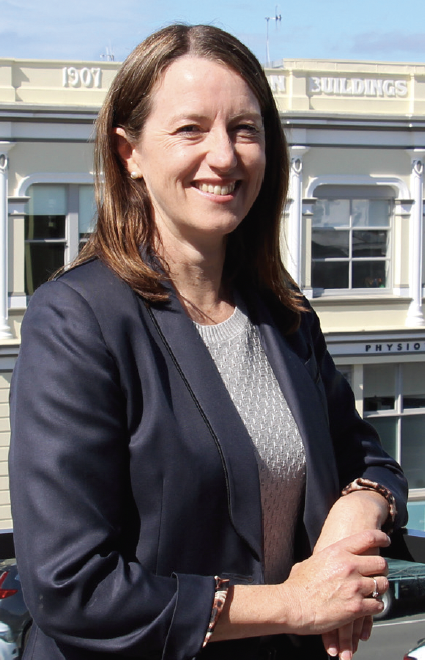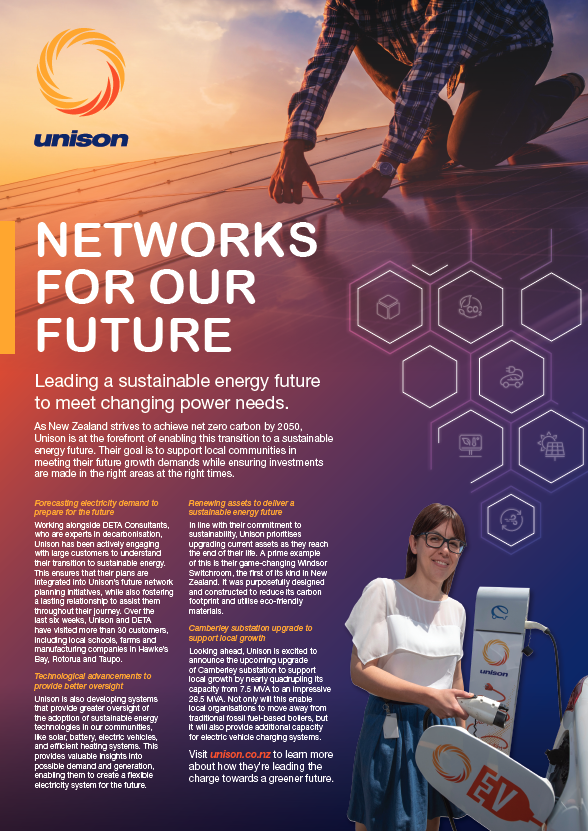The Regional Economic Development agency has appointed Lucy Laitinen as chief executive. Lucy comes from a CE role at Anglican Care Waiapu and has also had several roles with World Vision.
The Regional Economic Development agency is another reincarnation of the region’s many approaches to boosting the economy, attracting and supporting businesses. It is charged with delivering on the Matariki regional economic development agency as well as having a role in the cyclone recovery. The agency is based in the business hub in Queen Street Hastings, alongside the chamber of commerce and other business support agencies.
What is your career background?
I came into my role after being CEO at Anglican Care Waiapu for the last six years, which is the social services arm of the Anglican Diocese of Waiapu.
I oversaw the organisation’s social service delivery and brought a strong focus on evidence-based interventions and social return on investment. I also drove a transformation in the way the Diocese thought about, and deployed, its financial resources for impact through its investment strategy, partnerships, and, most importantly, through its relationship with the Mihināre/Māori Anglican Church.
Prior to that I held several general management roles at World Vision NZ in Auckland and have also have experience in local government and a small amount of time in central government. I lived and worked in Finland earlier in my career (my husband is Finnish) and worked for the International Organisation for Migration, a UN agency, responsible for developing and funding projects across the Nordic and Baltic states on migration-related issues such as human trafficking, asylum, and labour migration. All of this has given me an eclectic experience and skillset but the common theme throughout my career has been a drive to make a measurable social impact.
What skills/expertise do you bring to the role?
I am comfortable working at both the strategic and operational levels, have a strong work ethic, and am known for getting things done. I am always keen to look for evidence and good practice, constantly ask the ‘’why’’ question, and will try new approaches and push boundaries where I need to. I have a strong moral compass and I am pretty unfazed by challenges. I have a lot of experience in developing relationships and working collaboratively towards common aims, which gives me a real buzz. This is important for REDA as we are going to be more of an enabler and connector, rather than an implementer. I love learning, too, which is lucky because role is so broad and there is so much to learn and so many people to meet in Hawke’s Bay.
What is your experience in economic development?
I did my Masters in Development Studies at the University of Cambridge many moons ago and that strongly informs my approach to economic development. There are a lot of strategies and approaches that can be put in place to achieve economic development outcomes but it is how those decisions are made, who makes them, for whose benefit, and how they interact with other strategies, approaches, and policy settings that is important. As an obvious example, we might want to drive the growth of our economy through building our local businesses but we will achieve little without ensuring our workforce has the appropriate skills, that there is affordable, healthy housing, good public health provision, and we manage the environment well. While I was at Anglican Care Waiapu
I led an investment strategy that prioritised environmental and social return alongside financial return. It was inspiring to work with businesses that are looking beyond just short-term profit to thinking how they can deliberately support environmental and social outcomes. We can learn a lot from a te ao Māori approach to the economy, which is by nature takes an inter-generational, inclusive approach.
What do you see as role and day to day tasks of the REDA?
To support the region to improve its productivity, performance and to support business growth, facilitate a more even distribution of economic benefits, and help get Hawke’s Bay in a position to respond to and mitigate the effects of disruptions and shocks. Right now I am working with my Board to establish our priorities and outcomes for the next year, focusing on those things that will have collective benefit to the region. REDA will largely be a connector and facilitator though over time we will likely take on a role as advocate and voice on issues related to the economy.
What is the agency presently working on?
We are a start-up so I am working on the operational nuts and bolts like setting up our IT environment, setting up a finance system, making supplier agreements, and so on. REDA has also funded the regional freight distribution strategy, which will be finalised shortly, and is leading a piece of work to explore our telecommunications resilience in light of the dramatic and unexpected loss of communications after the cyclone. We are also setting up the event and office space and are working alongside the Recovery Agency and others to ensure that we understand what is needed in the recovery from an economic perspective. Top of the very large to-do list is, of course, finalising REDA’s key foundational documents and developing a strategic framework, business plan, and budget so we can properly get underway.
HB has had has several attempts at economic development agencies – what do you think is different this time?
I can’t speak to what has been before but there are a number of factors that should help make REDA successful. Some of these include having a strong, credible board with a highly respected and experienced chair and the fact that each director is personally committed to better social and economic outcomes for the region. Our shareholder mix is also a huge factor. We have iwi represented among our shareholder group, not just as stakeholders, as well as business and local government. Their common desire for a strong, effective regional economic development agency gives it every chance of success. We are also fortunate in that we have an agreed upon set of values and aspirations as a region via the Matariki strategy. Yes it needs refreshing, particularly after the cyclone, but everyone I have spoken to is committed to a regional economy that every whānau both benefits from and contributes to. Another positive is that we can set ourselves up for what is going to work for Hawke’s Bay and our particular environment and needs. We don’t need to model ourselves on any other agency.
How will the private sector/local businesses be included/informed/involved with the agency?
Two of our shareholders directly represent the business community – the Chamber of Commerce and the new Māori Business Network. I have met with a number of local businesses in my first weeks in the role and I look forward to developing ways to ensure we have regular communication with and input from the business community as we establish ourselves.
What do you think are HB’s greatest attributes for building a strong economy?
Our economy is built on a strong food and fibre base, we have a good port and a good airport, a strong tourism offering, a growing tech/knowledge sector, and a fantastic lifestyle to help keep and attract business. We are also recovering from a destructive cyclone and face significant challenges around our roading network, water security, housing, and land use, for example. It’s vitally important that these challenges are faced together as a community with a big picture view so that decisions made it one area don’t have unintended consequences for another. I think our region’s continued commitment to sustainability and inclusivity and to working together will be absolutely key to building a strong economy that benefits everyone.
With a strong economy – what do you see as important social outcomes?
The Matariki strategy, set by our local government and iwi leaders, has set a vision for a sustainable, accessible and resilient Hawke’s Bay economy where every whānau and household benefits. REDA has offered to support Matariki to articulate outcome measures for region. For example, what is really important to us in terms of our economy, health, social, and environmental outcomes? To do that we need a good understanding of what the data is saying right now and once our outcome measures are in place as a community we can target our strategies and interventions towards those. As I said earlier, building a strong regional economy is just one part of driving better social outcomes but the types of indicators we would hope to see in time will be things like a lift to household income at all levels, more young people in employment, training, or education, less young people feeding into gangs, a stronger sense of social cohesion, and far better social and economic outcomes for Māori and Pasifika.
What future do you see for the Great Things Grow Here brand?
I think it is too early for REDA to have a view on the future of the GTGH brand. What I will say is that it is important for any region to have a strong regional brand and good, accessible information for people looking for information about the region, whether that’s investors, people considering moving here for employment, businesses looking to relocate here, tourists, and so on.
What role will REDA have with the business hub in Hastings?
REDA has been given the responsibility to set up and run a business hub in Hastings. We have office space on the ground floor of 101 Queen St East (the old Post Office building), which we share with the Chamber of Commerce, Export NZ, NZ Trade and Enterprise, Business Central, the Māori Business Network and Export NZ. We are also in the process of fitting out an events and meeting space next door to our office space. This space will include a large conference room, two board rooms, and three smaller meeting rooms, along with a kitchen and small reception area. Once the fit-out is complete and we have a pricing strategy and operating model for the space we will open it up to the public, most likely in early 2024.
What do you do in spare time?
My husband Harri and I have a twelve-year old daughter, Mila, and nine-year old son, Max, so spending time with them is a priority. We enjoy travelling and try to get to Finland every year or so to visit my husband’s family as well as old friends. This is obviously important for maintaining family and cultural connections but also to reinforce the kids’ language skills as we are a bilingual family. I am a trustee on the Connect Community Trust that runs Kuhu Mai, the integrated community hub for Hastings’ whānau pounamu (homeless). I also love to read, try and keep reasonably fit, and enjoy what Hawke’s Bay has to offer.



